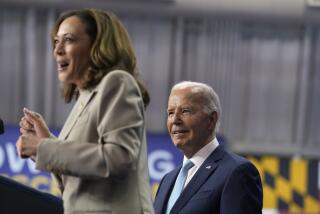Dispute Over Drought-Related Concessions : Cattle Producers Have a Beef With Dairymen
- Share via
WASHINGTON — A simmering feud between beef producers and dairymen has surfaced as Congress wrestles with legislation to aid drought-stricken farmers.
A group of beef cattlemen based in Texas has asked Congress to limit concessions to the dairymen, while the nation’s largest dairy farm cooperative says additional government help is necessary to avoid milk shortages and higher prices at the grocery store.
James L. Powell, president of the Texas & Southwestern Cattle Raisers Assn. in Ft. Worth, has asked Texas congressmen, including House Agriculture Committee Chairman Kika de la Garza, to oppose concessions to the dairymen that extend beyond suspension of a 50-cent cut in milk price supports and existing drought relief assistance programs.
Those programs include haying and grazing on land set aside from production and government-subsidized feed expenses in drought-stricken counties.
“Further concessions are unwarranted,” Powell wrote De la Garza, a Democrat, in a July 20 letter.
Jim Eskin, spokesman for Associated Milk Producers Inc. of San Antonio, Tex., the nation’s largest dairy farm cooperative, said the group is asking Congress to not only suspend the 50-cent cut in price supports, scheduled to take effect Jan. 1., but to increase price supports by about $1.06 per 100 pounds of milk.
The dairy association contends that the additional support is necessary to offset increasing feed costs caused by the drought, Eskin said Monday. Other industry officials say production has also been decreased because of the heat.
May Slaughter Herds
A failure to act would be “shortsighted” and could result in “letting milk production drop to dangerously low levels, which could lead to runaway prices for years to come,” Eskin said.
If farmers can’t afford or obtain feed they may be forced to slaughter their herds, which can take three years to rebuild, he said.
He said there has been “heavy movement of dairy cattle to slaughter, further documenting a rapidly deteriorating situation.”
The House Agriculture Committee is scheduled to complete action on drought-relief legislation today, with the bill possibly being considered by the full House on Thursday.
Jim Sumner, spokesman for Dairymen Inc., said the Louisvlle, Ky., cooperative is reporting shortages this week, and is 81-tanker trailers of milk below what is needed to fill orders in the Southeast and Mid-Atlantic.
Powell said the cattle raisers don’t think the dairymen “should be given favorable treatment over and above any other segment of agriculture. We’re trying to maintain a level playing field for all agriculture.”
“The secretary of agriculture has enough authority to deal with the drought situation. We’re not really certain you need additional legislation,” Powell said.
The dairymen and beef-cattle producers have been at odds off and on for several years, partly over an 18-month whole-herd buyout of dairy cattle that began April 1, 1986. About 1.22 million cows, heifers and calves were sold, mostly for slaughter and some for export, during the buyout. Dairy farmers collected about $1.8 billion in subsidies and about 38% of that cost was paid for by dairy farmers themselves through milk marketing fees levied on all producers. The subsidies, however, went to only those in the program.
Consumer Group Objects
The cattle producers contended that the buyout flooded the market with beef and depressed prices.
Don King, general manager of the Texas & Southwest Cattle Raisers, contends an increase in price supports could encourage production and lead to another whole-herd dairy buyout.
“We’ve already gone through that ringer two years ago,” he said.
A national consumer group, Public Voice for Food and Health Policy, also said drought-hurt dairy farmers deserve some federal aid, such as feed assistance, but “legislating a higher dairy support price is not justifiable.”
“Once again, the dairy producers are going whole hog for a special deal that would cost Americans more as taxpayers and a consumers,” said Public Voice executive director Ellen Haas. “And higher food prices impact hardest on those least able to pay. Mandating higher support prices for milk after feed costs slacken would once again encourage overproduction and government costs.”
More to Read
Sign up for Essential California
The most important California stories and recommendations in your inbox every morning.
You may occasionally receive promotional content from the Los Angeles Times.










